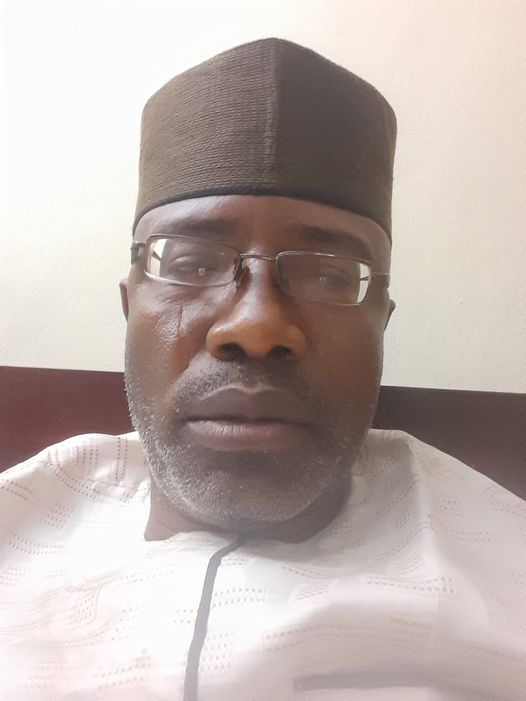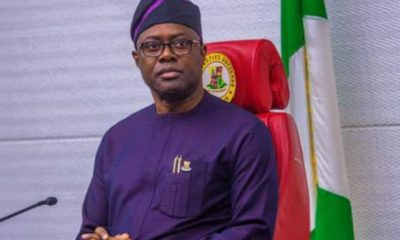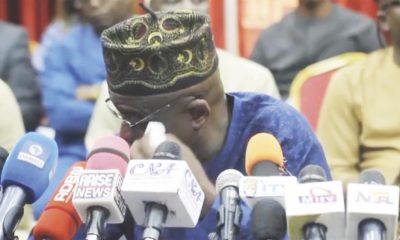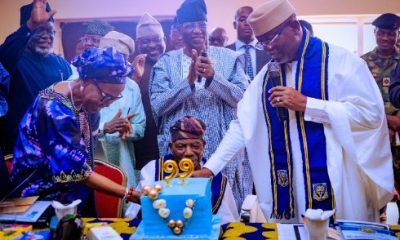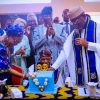Opinion
FOR THE RECORD : Writing Sikiru Ayinde Barrister’s biography By Tunde Busari
Being full text of a paper presented by TUNDE BUSARI, notable journalist and author of “My Journey With Barry Wonder”, a biography on the late music maestro, the late Alhaji Sikiru Ayinde Barrister, at the African Studies Association Conference, San Francisco, US. Busari is the Publisher/Editor-In-Chief of TheTabloid.net, a weekly conventional and digital magazine focusing on human interest news, features as well as entertainment. The paper is titled “Writing Sikiru Ayinde Barrister Bio/Autobiographical Narratives And African Popular Culture”.
Introduction
I consider it most appropriate to first introduce myself to this privileged gathering of intellectuals with a view to having a clear understanding of where I am coming from, as regards my experience as an author. My name is Mr Tunde Busari, a Yoruba man from Osun State, South-western Nigeria, geographically located about 300 kilometres away from the aquatic Lagos, which is the former capital of Nigeria before 1991 when the military regime of General Ibrahim Babangida relocated the seat of power to its current location in the Federal Capital Territory, Abuja.
I studied a joint Honours degree in History and International Relations from the prestigious Obafemi Awolowo University, Ile-Ife, a notable academic institution founded in 1962. After graduation, my life has since been shaped by my passion for the media and developmental journalism. I have worked in some respectable media organisations in Nigeria, Like Nigerian Tribune, Sunday Punch, National Life, The Nation, National Mirror, Newswatch and Hallmark, not in that order. Currently, I am Publisher/Editor-In-Chief of TheTabloid.net, a weekly conventional and digital magazine focusing on human interest news, features as well as entertainment.
It can be safely said that my special interest in entertainment industry partly formed the inspiration which led me to writing and publishing MY JOURNEY WITH BARRY WONDER, my very first effort in book publishing in 2021.
I wish to admit to the fact that the idea which transformed to this book is not entirely mine. External forces influenced it when it was clear to them that inside me was hidden some insightful perspectives to my subject, who was and still is a legend of a Nigerian indigenous music. He is Dr Sikiru Ayinde Balogun whose stage name remains Barrister. He lived between February 9, 1948 and December 16, 2010. He passed away in London while he was recovering from a certain surgical operation carried out in Indian and German medical facilities.
He started his musical career as Ajisaari, a music which was exclusive to the islamic community and which till date is practised during the month of Ramadan (fasting). Barrister first flirted with Sakara music, a popular indigenous music dominated by older generation of musicians of Yoruba origin. On account of his impregnable determination to carve a niche for himself, then, he transformed his music, named it fuji and claimed, at different occasions, that it was his invention.
Even though his personalisation of the genre had stirred controversy during and after his lifetime; a section of attentive public controverted it and argued that Barrister met fuji already in existence and not vice versa. However, a verifiable history seems to favour him because till date no other musician has been traced and established to have recorded an album and named his music fuji before Barrister did.
Record rather has it that musicians, who would later name their brand fuji, actually patterned their music after Barrister in recognition of the modest success his experiment was being achieved, particularly after his band’s historic tour to the Great Britain in 1978 and consequent release of an album titled ‘London Special’ shortly after their return to Nigeria.
Despite the unrelenting demand for my book by groups of Barrister fans, most of whom I met on social media, I was sincerely not keen to give it a thought. I was rather comfortable with my occasional expressions of my views on Barrister’s songs and sound on my facebook wall. That exercise was purely a fun to me being a practising journalist who is naturally obsessed with weaving words together for public education. Flair for writing and love for reading is a key requisite to becoming an outstanding journalist. This creed appeared to have matched my purpose in life, hence my choice of career in the newsroom where I freely and enthusiastically express myself in texts.
Though I have turned my facebook page to a platform where I dissect and debate topics of general interest-politics, entertainment, culture, business, technology and sports-, my multi-dimensional opinions on Barrister arguably connect better with my cult of readers who would “like”, who would “love”, who would react and send me complimentary words, including what could pass for garnished appraisals.
Many would write that they read and confirm for the first time certain blurry information about Barrister through my write-ups and urge me to continue to guide them. I can recall a particular respondent, who remarked almost authoritatively that he knew me to be close to Barrister at his Fuji Chamber residence during his lifetime. The shock here is that I never met that man beyond that surprise comment. Even if he walks up to me now or later, I will not recognize him.
Another compelling reason that caused me to write the book was the need to further appreciate the tireless struggle of Barrister to have weathered the storm of older genres, taken fuji to the front seat and made it a brand which opened employment windows to numerous youths, including those who are either limited in talent or not really gifted in the arts but who picked a role model in Barrister and cut a chunk from his fame and success. It is on record that the emergence of Barrister in the early 70s posed a danger to indigenous genres like Sakara, Apala, Highlife and Juju. Although juju music may be argued sustainably to have survived Barrister’s onslaught, Sakara, Apala and Highlife were not as lucky; fuji has pushed them to the rear and up to the point of near extinction.
How did Barrister achieve it?
He brilliantly tapped elements of these older genres into his fuji, thereby making fuji alluring to even die-hard fans of those genres of music. He completed what I will call his efforts of identification by waxing a vinyl he titled ‘Fuji Reggae Series 2’ in 1979 and came up with a distinct definition of fuji. In the album, he begins with a poser: “Ladies and gentlemen, who can tell me the full meaning of fuji sound?” He goes to explain: “Fuji sound is combination of music, consisting of Sakara, Apala Juju, Afro, Gudugudu, Aro possibly highlife.” Barrister performs his definition in the said album with an adaptation of Evangelist Ebenezer Obey, a juju music maestro, late Yusuf Olatunji’s Sakara and Fela Anikulapo-Kuti’s Afro beat lyrical lines. To further make himself clearer on his mission to enlarge the coast of fuji, he features for the first time a drum set, an instrument already known with Juju and Afro.
Aside promoting Barrister’s legacy in the history of indigenous music in Nigeria nay African continent, I wrote the book to contextualise the significance of fuji music as a distinct genre with arguably highest number of practitioners within Nigeria and across the Atlantic. In Yoruba-speaking states of Nigeria, almost every street produces at least a fuji musician. This is so because a band of fuji music is said to be easy to put together given the fact that only few local instruments like talking drums of different sizes, Sakara, Akuba (bass drum), Sekere, Igba and Agogo (gong) are basically required.
Beyond the sphere of fuji music, I wrote the book as my intellectual contribution to indigenous music in Nigeria. In this context, the book is a compliment to related literatures already on the book shelf. This is to broaden researchers’ options in the course of their data collection on evolution, development and exploits of Nigerian indigenous music. Consequent upon this, I owe, those who pushed and indeed put pressure on me until I gave in and delivered this book within a year of their intense campaign against my undisguised apathy, a debt of gratitude.
Burning the midnight oil
That said, writing MY JOURNEY WITH BARRY WONDER did not actually task me beyond my pre-production projection. Save for some research efforts in sourcing for materials, especially references from relevant literatures on subjects beyond entertainment, I was at home putting the words together. What I think really worked for me in this regard was the fact that I was walking on a familiar terrain; I was writing about my passion, which is Barrister. That is why I explain in details my early contact with him from the 70s to my later contact till he breathed his last 13 years ago. Of course, I interviewed select personalities-one of his wives, his singing son, his band members, his backroom staff, his friends and fans in order to give readers the much needed opportunity to have different sides of Barrister’s personage.
I deliberately refrained from writing what would look like a rehash of previous books earlier published about him. Hence, I focus essentially on my personal experience with him, his music and his career. So, the book smartly marries my history with that of Barrister. In other words, it is a two-in-one copy which presents two stories in one volume to inform, educate, clarify and entertain my readers, especially with the easy-to-digest prose and lucid style aimed at capturing interest of as many readers as possible because Barrister still controls unprecedented number of fans after death. It is even revealed by music marketers I interviewed across the South-western Nigeria that his records unbelievably enjoy patronage better than those of the living musicians.
Each of the 14 chapters in the 476-page book successfully digs out exclusive information about my relationship with Barrister’s music. I dwell on some landmark attributes that made up his person. I recall some of his live performances I was privileged to have watched. I also reveal how he was able to take fuji music from the streets to the bedroom of the political and economic elite. I explore his role as a social and public affairs analyst who waxed records to expose government deficiencies and proffer solutions to his identified areas. I analyse his talking drummers and their impacts in the development of his percussion.
Also, I recall the role I played in a series of articles I wrote in 2017 when an attempt was made to spit on Barrister grave. In addition, I recall how I was involved in a road accident at Ode Remo, Ogun State on my way to attend a Barrister occasion in Ikeja, Lagos in December 2020. A chapter also focuses on fuji musicians who style their sound and lyrical arrangements after that of Barrister. I take a step further in my narrative by pointing out few areas where I differ with Barrister’s songs and action. I do this critique of him for an audience as we have here at this gathering in order to have a balanced and objective view of his person. Another reason I explore his flip side is my realization that Barrister was not created an angel; he was a mortal who was fallible and indeed was prone to slip–and he did slip on a few occasions–in his words and actions.
Conclusion
Some feedbacks I have so far received from readers’ points to my display of profundity in Barrister’s composition of songs and sequence of his lyrics, including the sound of his instruments. The readers’ reactions describe me as one who had actively and closely followed Barrister with detailed ears and broad mind. They said that more than they had known before, the book has further helped their understanding of Barrister and his music such that they now relate with it as a guide when issues about Barrister arise. My modest interpretation of Barrister’s tracks on Nigeria’s socio-political issues from Nigeria’s Second Republic to 2005 is well acknowledged and commended as a chapter which, according to them, naturally arouse their desire to read the book to the last page.
On this note, I thank the organizer of this gathering. I specially am thankful to Professor Saheed Aderinto who facilitated my participation and to whom I refer as a biological brother I never had because of the value he has consistently added to my appreciation of knowledge and knowledge dissemination. Thanks to every participant. God bless you all.
Frontpage.com


